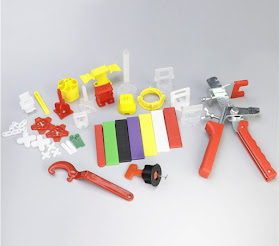It is common knowledge
among those who work in the tiling and stone industry that their tools are the
most important asset of their company. Diamond blades, hole cutters, tile
cutters, and tile spaces are the kinds of tools always present in a skilled
tiller's toolkit. However, not all tillers have access to the best tile leveling systems in
their arsenal. Many people in the tiling industry are under the impression that
they do not require tile leveling systems to produce great tile work.
Many years ago, this
may have been the case when tiles measured 200x200, 300x300, or 600x600, but due
to change in times, and the size of tiles has expanded significantly. The
availability of new tile types and sizes on the market has led to an increase
in the number of instances in which customers have expressed a desire to
install tiles with a large format. The size of these tiles and the
manufacturing procedures used for contemporary tile materials like porcelain
inevitably form curves or bows often referred to as Lippage.
What exactly is the
Lippage?
When tiles are not set
on the floor or wall to a regular level, a phenomenon known as Lippage can
develop. This will result in one tile having a
higher height than the other. This is typically the result of the tiles
becoming warped, unequal spacing between them, uneven grout lines, or variances
in the tiles' thickness. The phenomenon of warpage is particularly common in
kiln-fired clay goods and tiles with a large format. It is also typical in many
contemporary tiles, particularly those in the shape of rectangles, and has
long-to-short side lengths ratios.
Even while a floor
with a Lippage of up to 3 millimeters may be undetectable and risk-free, a
severe Lippage might compromise the tile installation's structural soundness
and make the floor hazardous. Severe Lippage can make walking on the floor
dangerous, and the problem may worsen with time due to dampness, settling, or
fractured tiles.
Tile Leveling System
prevents Lippage
When putting tiles on
walls or floors, using a BestTile Leveling System is the only failsafe approach to
guarantee that your products will be completely lippage-free after
installation. Clips and wedges are often included in a comprehensive Floor Tile Leveling Spacers.
These components work together to keep tiles from shifting as the compound
hardens. By clamping the edges of the tiles together by Flooring Spacers or Floor Tile Spacers and
bringing them to an even plane, tile leveling systems ensure that there will be
no discrepancies in elevation between the edges of neighboring tiles. This is
accomplished by bringing the tiles to an even plane. Keep in mind that tile
leveling techniques are not simply necessary for beginners. The systems are not
intended to be an alternative to skills; rather, they are intended to be
helpful tools that enable skilled laborers to create high efficiency and
effectiveness in their work.




No comments:
Post a Comment